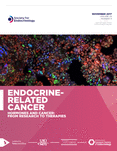Actions of endocrine-disrupting chemicals on stem/progenitor cells during development and disease
- Elizabeth Kopras*,
- Veena Potluri*,
- Mei-Ling Bermudez*,
- Karin Williams,
- Scott Belcher1 and
- Susan Kasper⇑
- Department of Environmental Heath, University of Cincinnati, 3223 Eden Avenue, Cincinnati, Ohio 45267-0056, USA
1Department of Pharmacology and Cell Biophysics, University of Cincinnati, Cincinnati, Ohio 45267-0575, USA
- Correspondence should be addressed to S Kasper; Email: susan.kasper{at}uc.edu
Abstract
Development and fate of the stem cell are regulated by extrinsic signals from the environment. Endocrine-disrupting chemicals which perturb hormonal signaling in utero and during early childhood may cause deregulation of multiple developmental processes, ranging from breakdown of stem cell niche architecture, developmental reprograming and altered stem cell fate to impaired organ and gonad development and sexual differentiation. Therefore, study of the environmental effects on stem cell integrity and normal development is a new and emerging focus for developmental biologists and cell toxicologists. When combined with new human and mouse stem cell-based models, stem cell differentiation dynamics can be studied in more biologically relevant ways. In this study, we review the current status of our understanding of the molecular mechanisms by which endocrine disruptors alter embryonic stem cell and adult stem/progenitor cell fate, organ development, cancer stem cell activity, and tumorigenesis.
- endocrine disruptors
- stem cell/progenitor cell
- cancer stem cell
- organ development
- steroid hormone receptors
- Revision received 6 November 2013
- Accepted 25 November 2013
- Made available online as an Accepted Preprint 26 November 2013
- © 2014 Society for Endocrinology












